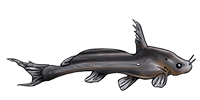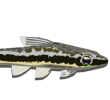| Scientific Name | Leporacanthicus galaxias Isbrücker & Nijssen, 1989 |
| Common Names | L029, Galaxy Pleco Ruesselzahnwels (Germany), Tocantins Galaksesugemalle (Denmark), Tusken Pleco, Vampire Pleco |
| Type Locality | Rio Tocantins, Lagoa em frenta a Jacobal, Pará State, Brazil. |
| Pronunciation | lepor ah KAN thi cuss - gah lax ee ass |
| Etymology | Latin, lepus, leporis = rabbit + Greek, akantha = thorn. This specific epithet refers to its milky (galaxias=milky or milky way) white spots. |
| Articles | |
| Size | 211mm or 8.3" SL. Find near, nearer or same sized spp. |
| Identification | All Leporacanthicus spp. have a small backwards facing slightly proud blunt thorn-like plate on top of their heads. L. galaxias (L029) is distinguished from L007 (L. cf. galaxias) by its lower dorsal fin, a longer snout and smaller spots. |
| Sexing | Adult males have a much longer and broader head with small odontodes on the sides of head, more odontodes on pectoral fin spine and on the whole body, a bigger dorsal fin and normally a prettier coloration. |
| Distribution | South America: southern tributaries of the middle and lower Amazon, Madeira, Tocantins and Guamá rivers; also known from the Ventuari River basin in the upper Orinoco drainage. Amazon, Lower Amazon, Tocantins (click on these areas to find other species found there) Amazon, Middle Amazon (Solimoes), Madeira (click on these areas to find other species found there) Amazon, Lower Amazon, Guamá (click on these areas to find other species found there) Orinoco, Upper Orinoco, Ventuari (click on these areas to find other species found there) Amazon, Lower Amazon, Nhamundá (click on these areas to find other species found there) Login to view the map. |
| IUCN Red List Category | Least Concern , range map and more is available on the IUCN species page. Last assessed 2020. |
| pH | 5.6 - 7.0 |
| Temperature | 22.0-26.0°C or 71.6-78.8°F (Show species within this range) |
| Other Parameters | This fish originates in fast flowing rapids so you should supply this fish with an oxygen rich strong current environment. I used powerhead driven UGFs with ventura style air / water mixing and an external bucket filter to keep this fish with sturdy medium sized Geophagus and Acaricthys cichlids which didn't mind the extra current too much. |
| Feeding | Prawns and Snails are top of the menu, but the fish will learn to eat most off-the-shelf foods. User data. |
| Furniture | Prefers bogwood and darker rocks. Not seen often during the day. |
| Compatibility | Gets on with small lively catfish but avoid other larger bottom dwellers (unless space permits) due to the territorial disputes. |
| Suggested Tankmates | Most small to medium community fish. Tetras and South American cichlids are ideal, unless you really go for it when providing a strong water current. |
| Breeding | Has been accomplished but, sadly, not documented. |
| Breeding Reports | There are 4 breeding reports, read them all here. |
| Reference | Die Aquarien- und Terrarienzeitschrift (DATZ) v. 42 (no. 9), pp 546, Figs 8-10, 13-15. |
| Registered Keepers | There are 65 registered keepers, view all "my cats" data. |
| Wishlists | Love this species? Click the heart to add it to your wish list. There are 2 wishes to keep this species, see who wants what. |
| Spotters | Spotted this species somewhere? Click the binoculars! There are 19 records of this fish being seen, view them all. |
| Forum BBCode | |
| Search for L. galaxias | |
| Look up L. galaxias on AquaticRepublic.com | |
 | Look up L. galaxias on Fishbase |
 | Look up L. galaxias on Encyclopedia of Life |
 | Look up L. galaxias on Global Biodiversity Information Facility |
| LFS label creator ARN ref:1.4.64.138 | |
| Last Update | 2025 Jan 02 01:36 (species record created: 2001 Apr 25 00:00) |





/siluriformes/loricariidae/leporacanthicus/galaxias/1.jpg)
/siluriformes/loricariidae/leporacanthicus/galaxias/2.jpg)
/siluriformes/loricariidae/leporacanthicus/galaxias/3.jpg)
/siluriformes/loricariidae/leporacanthicus/galaxias/4.jpg)
/siluriformes/loricariidae/leporacanthicus/galaxias/5.jpg)
/siluriformes/loricariidae/leporacanthicus/galaxias/6.jpg)
/siluriformes/loricariidae/leporacanthicus/galaxias/7.jpg)
/siluriformes/loricariidae/leporacanthicus/galaxias/8.jpg)
/siluriformes/loricariidae/leporacanthicus/galaxias/9.jpg)
/siluriformes/loricariidae/leporacanthicus/galaxias/10.jpg)
/siluriformes/loricariidae/leporacanthicus/galaxias/11.jpg)
/siluriformes/loricariidae/leporacanthicus/galaxias/12.jpg)
/siluriformes/loricariidae/leporacanthicus/galaxias/13.jpg)
/siluriformes/loricariidae/leporacanthicus/galaxias/14.jpg)
/siluriformes/loricariidae/leporacanthicus/galaxias/15.jpg)